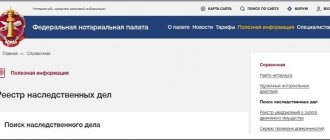What do you have to pay for when receiving an inheritance?
The purpose of payment and the amount for entering into an inheritance depend on many factors and are calculated individually in each specific case. The value of the inherited property, the degree of relationship, and the method of accepting the inheritance affect the amount of expenses that the legal successor will incur when applying for notarial acts.
Basic payments:
- Notary services – legal and technical. For example: opening and reading a will, drawing up powers of attorney and certifying signatures. The amount of payment for legal and technical services (legal and technical services) is not regulated by law and varies significantly in different regions of Russia. In each subject of the Russian Federation, the amount of payment for notary services for the current year is approved by the regional notary chamber.
- Appraiser services. The cost of appraiser services depends on the type of object, timing and region.
- State duty for issuing a certificate of inheritance. The amount of the state duty depends on the degree of relationship between the testator and heir and the amount of valuation of the inherited property.
- State registration of inherited objects.
- Additional costs - obtaining a certificate, registering the property with the cadastral register, performing notarial acts at home.
Stages of inheritance
First of all, in order to formalize inheritance rights, the successor must go to a specialist within six months from the date of death and life of the testator. This must be done with a death certificate (issued without payment), a passport, and other documents. A lawyer in an office located at the location of the property will accept the application and open an inheritance case. The cost of this operation is about 1100 rubles.
The step-by-step procedure for accepting an inheritance is as follows:
- obtain a death certificate from the registry office;
- collect a package of documents;
- no later than 6 months, go to a specialist.
During the procedure, the notary accepts applications from other legal successors and creates a list of property recipients and their parts. As the deadline for closing the case approaches, legal successors pay state fees and notary expenses upon entering into an inheritance.
After 6 months, and not earlier, the successor receives a certificate of inheritance. Next, he applies the document to the State Register or the State Traffic Safety Inspectorate, where he registers ownership of the apartment, dacha or transport. You will have to pay 2,000 rubles for entering information into the Unified State Register in Moscow. For a change of car owner – about 2800.
What is included in the list of documents required to obtain rights?
- death certificate;
- certificate from the residential address of the deceased;
- will, if any;
- birth certificate, other documents certifying relationship;
- a fragment from the house register, if the successor lived with the deceased;
- documents for real estate: certificate of ownership, purchase and sale agreement, deed of gift;
- certificate from the BTI about the price of the apartment.
If a vehicle is inherited, the successor should be provided with:
- vehicle registration certificate;
- PTS;
- gift or sale agreement;
- property valuation act.
When inheriting other property, for example, deposits or shares, you will need a savings book, an extract from the register of shareholders, as well as other documents confirming property rights.
Note! According to the law, lawyers do not have the right to demand from successors an extract from the Unified State Register on the legal purity of the property. From October 12, 2015, information is requested by the lawyer independently.
Benefits when applying for notarial acts
Art. 333.38 of the Tax Code of the Russian Federation provides benefits for paying state fees when applying for notarial acts.
The following are exempt from paying state duty:
- disabled people of groups I and II – by 50 percent for all types of notarial acts;
- individuals – for issuing certificates of the right to inheritance during inheritance:
- objects of real estate - a residential building, a plot of land on which a residential building is located, apartments, rooms or shares in the specified real estate, if these citizens lived with the testator before and after his death.
- property of persons who died in connection with the performance of their state or public duties.
- deposits in banks, funds in bank accounts, insurance amounts, pensions, copyrights.
Where can I get a property valuation?
Since the amount of the duty paid depends on the value of the property, there is a need for an assessment. Heirs need to contact the appropriate organization.
To assess the land, you can visit Rosreestr or another specialized organization at the location of the site. A written agreement will also be required.
An apartment assessment report can be obtained from the BTI (built before 2013) or from a commercial organization. The cost of services of appraisal companies starts from 3,000 rubles.
The assessment is carried out taking into account the requirements of the Federal Law dated July 29, 1998 No. 135-FZ. The period for assessing real estate ranges from 5–7 days. The deadline is 1 month.
Much depends on the intended purpose of the property and its market value. In the case of plots of land, their size is also taken into account. The valuation of a vehicle is carried out according to the same scheme as real estate.
If the subject of the inheritance is shares or money in foreign currency, then the amount of the fee will be determined in accordance with the Central Bank exchange rate on the day the inheritance is opened.
After the property has been assessed, the heirs must be given an act (report). Based on it, the amount of state duty is calculated.
Example : Citizen A. received an apartment by right of inheritance. After visiting the notary, he was told that a real estate appraisal was required. Not knowing all the details, citizen A. contacted the specified company. The apartment was assessed at a market value of 2,500,000 rubles. Calculation of the duty amount – 2,500,000 x 0.3% = 7,500 rubles. Later, the heir learned from a lawyer friend that there are 3 types of valuation, and the market one is the most disadvantageous in terms of the amount of the duty. Having contacted the BTI, citizen A. received a different assessment amount - 812,000 rubles. Calculation of the tax amount – 812,000 x 0.3% = 2,436 rubles. Ultimately, option 2 was chosen, where the amount of the fee decreased by more than 3 times.
The amount of the state fee for issuing a certificate of inheritance
Subclause 22 of clause 1 of Article 333.24 of the Tax Code of the Russian Federation establishes the amount of the state duty for issuing a certificate of inheritance.
Relatives
A person not related to the testator by blood is required to pay a state fee in the amount of 0.6 percent of the value of the property received, but not more than one million rubles, to obtain the certificate.
However, for close relatives of the testator, the amount of the state duty is much less and amounts to 0.3 percent of the value of the inherited property, but not more than one hundred thousand rubles.
This rule applies to parents, spouse, children (natural and adopted), full brothers and sisters of the testator.
In this case, it is necessary to prove the existence of a family relationship and provide supporting documents:
- spouse – marriage certificate;
- parents - birth certificate of the deceased, in which the applicants for the inheritance are indicated in the father and mother column;
- children - birth certificate, where the testator’s data is indicated in the father column;
- brothers and sisters – their own and the testator’s birth certificate.
Do close relatives pay inheritance tax?
Disabled people of 1st and 2nd groups
In accordance with Art. 333.38 of the Tax Code of the Russian Federation, disabled people of groups 1 and 2 are exempt from paying state fees for all types of notarial acts by 50%.
To take advantage of this benefit, it is necessary to document the fact that a citizen is recognized as disabled and the establishment of a disability group.
The confirmed disability group must be in effect at the time of filing the application for a certificate of inheritance.
Pensioners
Parents, children, official spouse, dependents who have reached retirement age have the right to a mandatory share in the inheritance, even if there is a will.
The size of the mandatory share is ½ of the share in property that a citizen would receive by law.
If the testator has not included in the will a pensioner entitled to an obligatory share, the latter, regardless of his financial situation, may apply to the court with a request to allocate the required share in the inheritance.
Pensioners pay state fees on a general basis.
Minors
Heirs who have not reached the age of majority by the day the inheritance is opened are exempt from paying state duty upon receipt of a certificate of the right to inheritance in all cases, regardless of the type of inherited property.
To take advantage of the benefit, the heir must confirm that at the time of filing the application for a certificate of inheritance rights he was under 18 years of age. A document confirming this fact is a passport or birth certificate of the heir.
Nowadays, teenagers strive to become independent and self-reliant. Emancipation of minors occurs quite often. If a teenager has undergone the emancipation procedure, he still retains the right to benefits.
Incompetent
Persons suffering from mental disorders, over whom guardianship has been established in accordance with the procedure established by law, are exempt from paying state fees when receiving a certificate of the right to inheritance in all cases, regardless of the type of inherited property.
To receive the benefit you must present:
- civil passport of the ward and guardian;
- guardianship order;
- documents confirming mental illness.
Cohabitation of the heir with the testator
A citizen who inherited the testator's real estate and lives with him on the day of death and after this date is exempt from paying state duty upon receipt of a certificate of the right to inheritance. It doesn’t matter who they are to each other - relatives or strangers. The benefit applies only to the property that was the place of residence of the heir and the testator.
For other property, the heir pays state duty according to the established amount.
Formulas and examples of calculating the costs of inheritance
Example 1. After his death, a man left his heirs (his wife and two daughters) a homeownership that he inherited from his parents. Such property is not recognized as jointly acquired property, so it was divided in equal shares between each family member.
The cadastral value of the house was 5 million rubles. Due to the fact that the heirs were close relatives of the deceased, the state duty was calculated at a rate of 0.3%:
5,000,000 *0.3/100 = 15,000 rubles.
Payment of the notary fee was made by each legal successor in the amount of 5,000 rubles. In addition, the heirs reimbursed the expenses of the notary's office in the amount of 4,000 rubles.
Example 2. After the death of a single citizen, a car worth 2 million rubles was left behind. The man had no children and divorced his wife. The only relative who could inherit was the nephew. He began to register the rights to the property. Since the heir was not a close relative of the deceased, the state duty is calculated using the following formula:
2,000,000*0.6/100 = 12,000 rubles.
In addition, the testator's nephew reimbursed the appraiser's expenses in the amount of 5,000 rubles and the technical services of a notary. The total amount spent by the assignee was 21,000 rubles.
Example 3. A girl inherited from her father an apartment worth 3 million rubles and was indicated in the will. Besides her, the man had a 30-year-old son from his first marriage, about whom there were no documentary orders. There were no minors or dependents in the family.
According to the law, the girl has the right to real estate in the amount of 100. The registration fee is calculated as follows:
3000 000 *0.3/100=9000 rubles.
In addition, the heiress paid the notary's expenses in the amount of 5,000 rubles. It does not include the fee for registering property in the Unified State Register of Real Estate - 2,000 rubles, which the girl gave to the territorial body of Rosreestr.
Inheritance tax benefit
Heirs are exempt from paying income tax when receiving an inheritance. However, when selling inherited property, they must pay tax on the income received from the sale of this property.
It amounts to:
13% – from residents of the Russian Federation;
33% – from non-residents of the Russian Federation.
According to the provisions of Article 217.1. The Tax Code of the Russian Federation exempts from taxation income from the sale of real estate received by inheritance if the minimum period of ownership of this object is three years.
When determining the size of the tax base, the taxpayer has the right to receive property tax deductions provided taking into account the specifics and in the manner provided for in Article 220 of the Tax Code of the Russian Federation. The tax base can be reduced by an amount not exceeding one million rubles.
If the income from the sale of property is less than one million rubles, you do not need to pay tax.
How is the state duty paid?
Duty Payment Options
| No. | Option | Payment order |
| 1 | Cash | Payment is made at any bank based on a receipt issued by a notary. The amount of the fee depends on the financial institution. In addition, funds can be separated directly at the notary’s office. This option is a priority. |
| 2 | Through ATMs | The payer will have to independently enter the payment details, its purpose, the name of the recipient and the amount of the contribution. A prerequisite is to receive a receipt. |
The nuances of paying state duty by several recipients of an inheritance
The state fee is paid by all heirs. This rule is not followed when receiving a specific property share by inheritance.
Example
Petrov G.V. left all his own property as an inheritance to several heirs: a car to his son B.G. Petrov, a two-room apartment to his daughter D.G. Petrova, and a dacha to his neighbor L.V. Krasnov. In this case, all heirs pay a state fee of specific in full.
If Petrov had left his son both his car and half of the two-room apartment, then his daughter would have become the heir to 1⁄2 of the share, and not the entire apartment, and would have paid only 1⁄2 of the duty.
Additional costs
In addition to the mandatory inheritance fee, you will also need to pay notary fees, which include the services of a probate specialist.
The cost is formed from a number of payments:
- announcement of the text of the will – 300 rubles;
- safety of property entrusted to the notary – 300 rubles;
- signature authentication – 100 rubles.









